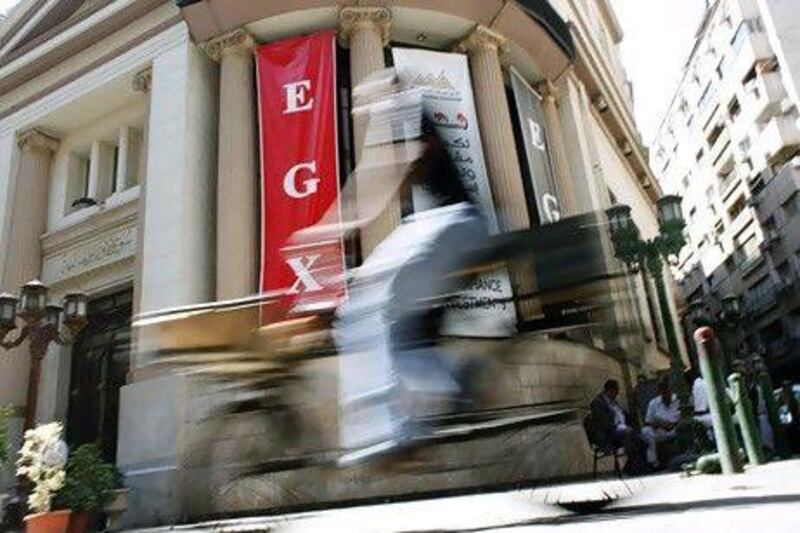Billions of dirhams were wiped from the value of stocks across the region yesterday as Israeli bombardment of Gaza continued for a fifth day.
The Cairo bourse led the declines, losing as much as 3 billion pounds (Dh1.8bn) of value, or more than 3 per cent, as fund managers shunned risky asset classes after a marked shift in Egyptian foreign policy towards Israel.
The Egyptian exchange is the only stock market in the region classified as an "emerging" market by the international index provider MSCI, and as such is considered a regional bellwether by international investors.
"Egypt is owned by a lot of emerging-markets funds, and with trouble happening right next door to them, the fund managers are thinking we probably want to take risk off the table," said Saleem Khokhar, the head of equities at National Bank of Abu Dhabi.
The benchmark EGX 30 Index tumbled 3.2 per cent yesterday to 5,478.38 points.
"Egypt has been quite vocal in terms of what they think about the Israeli aggression," Mr Khokhar added. The Egyptians "are definitely showing a different side to whatever they had before under the [former president Hosni] Mubarak regime".
Mohammed Morsi, the Egyptian president, withdrew his ambassador to Israel on Wednesday following the attacks and called for an emergency meeting to be convened with foreign ministers of the Arab League.
On Friday, Mr Morsi sent his prime minister, Hisham Qandil, to Gaza in a show of support.
Egypt's stocks were hit indiscriminately across the country's major sectors and blue-chip firms.
Palm Hills Development, a luxury property developer, tumbled 6.2 per cent to 2.42 pounds. Orascom Telecom, North Africa's biggest mobile phone company, dropped 3.4 per cent to 3.59 pounds.
EFG Hermes, the region's biggest investment bank, fell 2.3 per cent to 10.91 pounds. Ezz Steel, the country's largest publicly traded steel manufacturer, lost 4.6 per cent to 9.15 pounds.
Egypt strongly relies on western aid, which has been in place ever since a peace treaty was signed with Israel in 1979. Mr Morsi has been in discussions with the IMF over a US$4.8 billion (Dh17.63bn) loan to kick-start the country's economy, which was hard hit after the revolution that toppled Mr Mubarak last year.
"After such sweeping headlines, people fear it could potentially lead to a wild card, such as Egypt revisiting and amending certain parts of the [1978] Camp David agreement," said Wafik Dawood, head of institutional sales at Mega Investments Securities in Cairo.
"This is despite the fact that Morsi, ever since he was sworn into office, has offered reassurance over his commitment to maintain the treaty with Israel. On the ground, the majority of people know that nothing can materialise in terms of intervention, it's all headlines and newspapers," Mr Dawood added.
Elsewhere in the region, Qatar's market declined to its lowest level since August 7 after its foreign minister said Arab League meetings were "wasteful" and that it was time for "a clear and honest review" to resolve the Palestinian situation.
Qatar's EGX 30 Index fell 0.8 per cent to 8,377.32.
Last night, Mr Morsi met with the Turkish prime minister Recep Tayyip Erdogan and said there were signs that a truce might be reached between Hamas and Israel.
Israel's TA-25 Index, on the other hand, advanced 0.6 per cent to 1,188.97.
"Investors see the military action coming to an end and are coming back to the market," Richard Gussow, a senior analyst at DS Securities & Investments in Tel Aviv told Bloomberg.
In the UAE, the Abu Dhabi Securities Exchange General Index lost 0.3 per cent to 2,681.33, while the Dubai Financial Market General Index fell 0.9 per cent to 1,601.14.
Kuwait's index declined 0.5 per cent to 5,769.24.
Bahrain's measure lost 0.3 per cent to 1,054.01.
Oman's MSM 30 Index fell 0.3 per cent to 5,617.55.
The Saudi Tadawul All-Share Index fell 0.4 per cent to 6,765.29.
"There is a risk-off trade right now," said Haissam Arabi, the chief executive at Gulfmena Investments, an asset manager in Dubai.
"Investors are pricing in the consequences of a possible escalation of regional tensions, but it's too early to determine what the real implications will be."





